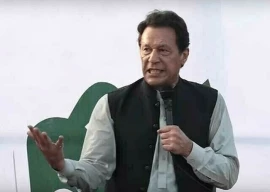
The party, which says it is non-violent but is accused by some analysts of seeking a coup in Islamabad, added that "powerful factions" in Pakistani society including the military should also take part, but violence had no place in its work.
Hizb ut-Tahrir won international attention when Pakistan's army said on June 22 it was questioning four majors about alleged links to the party, following the arrest in May of a brigadier suspected of having such ties.
Brigadier Ali Khan, whose lawyer has denied the allegations, was the highest-ranking serving officer arrested in a decade.
The Pakistan army is under pressure to remove extremist sympathisers in its ranks after US forces found and killed Osama bin Laden in Abbottabad on May 2.
In an interview, party spokesman Taji Mustafa said the party sought to emulate the creation of the first Islamic state in what is now Saudi Arabia by "winning public opinion in favour of Islam" through discussions, marches and rallies.
The party worked "to motivate all sections of society to express their determined will, such that they take to the streets and demand the Islamic Caliphate system."
The party and its goal of an Islamic ruler, or Caliph, who implements sharia law posed no threat to Pakistan, said Mustafa, based in Britain, where the party is not banned.
"The threat to Pakistan comes from Zardari, Kayani and Gilani who support drone strikes that kill their own citizens, and who collude with a US-led war of terror," he said, referring to the president, army chief and prime minister.
Powerful factions
Security analysts say the party, not normally seen as a top security threat, has struggled to win mass support in Pakistan and focuses its message on the army since a coup would be the easiest way to oust the civilian government.
The party's Pakistan branch issued a statement earlier in June saying Muslims all over the world, or the "Ummah", were looking to Pakistan's army to provide support for the party's goal of setting up an Islamic state, or Caliphate (Khilafah).
Asked to comment, Mustafa said the party's search for their support was not aimed at obtaining armed backing since that "contradicts our method for bringing about change."
"Seeking nusrah (support) was a practice of Prophet Mohammad (pbuh) when he worked to establish the first Islamic state in Medina," he said.
"It is to ask the powerful factions in society – including the military - to support our call for the implementation of the Khilafah system, to side with the people and to stop propping up the current treacherous regime which is using the military to fight its own citizens as it supports America's war and drone strikes - something that is hugely unpopular."
Mustafa said that globally the party operated in more than 40 countries, both Muslim-majority and -minority countries. It sought to bring the former under a Caliphate. In the latter, it sought to preserve a strong Islamic identity among Muslims.
"Despite the attempts of several Western-backed rulers to ban Hizb ut-Tahrir in parts of the Muslim world, our call for the Khilafah system is gaining traction by the day from Indonesia to Tunisia," he said.
His remark echoes those of many organisations that portray this year's Arab uprisings against political despotism and economic stagnation as inspired by religion. Many Arabs say religious groups have played only a minimal role.
COMMENTS (67)
Comments are moderated and generally will be posted if they are on-topic and not abusive.
For more information, please see our Comments FAQ
1732063440-0/elon-(3)1732063440-0-405x300.webp)

1732062434-0/elon-(2)1732062434-0-165x106.webp)





1731749026-0/Copy-of-Untitled-(3)1731749026-0-270x192.webp)








@najib moha I would spare you, because first of all, you have not demonstrated the capacity of understanding it. by the way, do you believe in Islam, (Quraan, Hadeeth) and Muhammad as the final messenger?
I may answer you once I am confirmed with the believe that you do believe on Islam and Muhammad SAW as the final Messenger.
Regards
@Talha: and so are u!
@Junaid Alam: Because newspapers also have an obligation and an oath to tell TRUTH and not be a propaganda machine.
@Tariq: Mr Tariq, every system has not failed in every country. And secularism failed in Pakistan only because of extremist ideology propagated by brain washed people. Try leaving in some Arab country if you are so bent on loving some ideology that is not concurrent to Pakistan's history, allright??
@Imran Changezi: Why dont you move to Arab country as they already have some sort of Caliphat. Stop trying to destroy my Pakistan, allright???
@Muhammad Mustafa Mustaan: Si is absolutely right, And whatever bad things Britain did, taht was past. you understand progrression of humankind right???So , what happened in 17th and 18th century is no more acceptable in modern society. but people like you seem to have missed the march of history and are left back sucking the blood of normal people/progressive muslims who want to live peacefully with other human beings. And Please spare me your lectures on history , try looking at your own history FIRST. What you did to Bengali muslims, Ahmadis, Sikhs in Pakistan. As I already mentioned, you missed the history bus!!